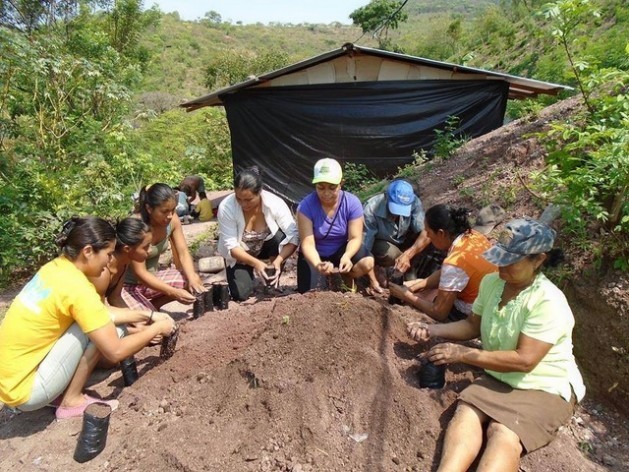by LOSE ADAN SILVA
 Members of a cooperative of women farmers in Nicaragua build a greenhouse for thousands of seedlings of fruit and lumber trees aimed at helping to fight the effects of climate change in a village in the department of Madriz. PHOTO/Femuprocan
Members of a cooperative of women farmers in Nicaragua build a greenhouse for thousands of seedlings of fruit and lumber trees aimed at helping to fight the effects of climate change in a village in the department of Madriz. PHOTO/Femuprocan
A group of women farmers who organised to fight a centuries-old monopoly over land ownership by men are seeking plots of land to farm in order to contribute to the food security of their families and of the population at large.
Matilde Rocha, vice president of the Federation of Nicaraguan Women Farmers Cooperatives (Femuprocan), told IPS that since the late 1980s, when women trained in the Sandinista revolution organised to form cooperatives, access to land has been one of the movement’s main demands.
According to Rocha, as of 1997, the organisation has worked in a coordinated manner to fight for recognition of the rights of women farmers not only with regard to agriculture, but also to economic, political and social rights.
Femuprocan, together with 14 other associations, successfully pushed for the 2010 approval of the Fund for the Purchase of Land with Gender Equity for Rural Women Law, known as Law 717.
They also contributed to the incorporation of a gender equity focus in the General Law on Cooperatives and to the participation of women in the Municipal Commissions on Food Security and Sovereignty.
For Rocha, this advocacy has allowed rural women to update the mapping of actors in the main productive areas in the country, strengthen the skills of women farmers and train them in social communication and as promoters of women’s human rights, to tap into resources and take decisions without the pressure of their male partners.
“For rural women, land is life, it is vital for the family; land ownership and inputs to make it productive are closely linked to women’s economic empowerment, to decision-making about food production, to the preservation of our environment, and to ensuring food security and protecting our native seeds to avoid dependence on genetically modified seeds,” said Rocha.
Inter Press Service for more